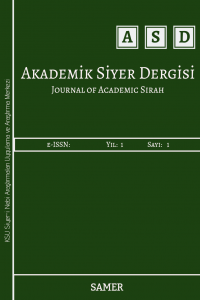Abstract
Bu
çalışmada Mâtürîdî’nin (ö.333/944) Hz. Peygamber ile irtibatı kurulan bazı
rivayetlere yönelik özgün yorumları konu edilmiştir. Bilindiği üzere hitap,
muhatabı tarafından anlaşılır. Hitabın dolaylı muhatabı, onu anlamak için ilk
muhatabın açıklamalarına ihtiyaç duyar. Söz konusu Kur’ân-ı Kerîm ve onu anlama
faaliyeti olunca mezkûr durum daha bir önem kazanır. Çünkü Kur’ân’ın, hitap
çevresinde bilinmesi nedeniyle ayrıntılarına girmediği hususlar vardır. Bu
hususlar onun ilk muhataplarının rivayetleriyle anlaşılabilecektir. Ne var ki
bu rivayetlerin bazısı bünyesinde problem taşımaktadır. Rivayeti aktaran
ravinin tasarrufta bulunması problemin önemli gerekçeleri arasındadır. Diğer
yandan geleneğin de etkisiyle rivayetlerin taşıdığı önem, zaman içerisinde
onların kritik edilmeksizin kabul edilmesine yol açmıştır. Bu ise kimi
durumlarda ayetlerin anlam dünyasının daraltılmasına, kimi durumlarda da
Kur’ân’ın vermek istediği mesajın anlaşılmasına mani olmuştur. İş bu makalenin
amacı ise Mâtürîdî’nin mezkûr problemlere karşı sergilediği tutumu ortaya
koymaktır. Bu amaç doğrultusunda mukayese yöntemi kullanılmış ve neticede onun
sorunlu gördüğü rivayetleri Kur’ân’ın bütünlüğünü, vahiy ortamının genelini ve
aklın verilerini dikkate almak suretiyle reddettiği anlaşılmıştır. Yine onun,
ayetle irtibatlandırılan rivayetin hangi açıdan kusur barındırdığını ifade
ettiği ve nihayet sahih bile olsa bazı durumlarda ayetin rivayetten bağımsız
olarak okunabileceğini söylediği görülmüştür.
References
- Düzenli, Yaşar. “Haberlerde Tedricilik ve Cinlerin Kulak Hırsızlığı Meselesi”. İstanbul Üniversitesi İlahiyat Fakültesi Dergisi 22 (Mart 2012), 125-154.
- İbn Ebî Hâtim, Muhammed Abdurrahman b. Muhammed b. İdrîs. Tefsîru İbn Ebî Hâtim er-Râzî el-müsemmâ et-tefsîru bi’l-me’sûr. nşr. Ahmed Fethi Abdurrahman el-Hicâzî. 7 Cilt. Beyrut: Dâru’l-Kütübi’l-Ilmiyye, 2006.
- İbn Kesîr, Ebu’l-Fidâ’ İmâdüddîn. Tefsîrü’l-Ḳurʾâni’l-ʿazîm. 4 Cilt. İstanbul: Çağrı Yayınları,1986.
- İbnü’l-Cevzî, Ebu’l-Ferec. Zâdü’l-mesîr fî ılmi’t-tefsîr. thk. Ahmet Şemsüddîn. 8 Cilt. Beyrut: Dâru’l-Kütübi’l-İlmiyye, 2009.
- Köse, Feyza Betül. Kâhin. İstanbul: Endülüs Yayınları, 2018.
- Mâtürîdî, Ebû Mansûr Muhamed b. Muhammed b. Mahmûd. Te’vîlâtü’l-Kur’ân. Müracaa Bekir Topaloğlu. nşr. Ahmed Vanlıoğlu vd.. 18 Cilt. İstanbul: Mizân Yayınları, 2005-2010.
- Mâverdî, Ebu’l-Hasen Ali b. Muhammed. en-Nüket ve’l-ʿuyûn: tefsîru’l-Mâverdî. thk. Seyyid Abdu’l-Maksud. 4 Cilt. Beyrut: Dâru’l-Kütübi’l-İlmiyye, 2007.
- Öz, Şaban. İlk Siyer Kaynakları ve Müellifleri. İstanbul: İSAR Yayınları, 2008.
- Saʿlebî, Ebū İshâk Ahmet b. Muhammed b. İbrahim. el-Keşf ve’l-beyân. thk. Hâlit b. Avn el-Anzī. 33 Cilt. Cidde: Dāru’t-tefsīr, 2015.
- Semerkandî, Ebû Bekr Alâüddîn Muhammed b. Ahmed b. Ebî Ahmed. Şerḥu teʾvîlâti’l-Ḳurʾân. İstanbul: Süleymaniye Kütüphanesi, Medine 179, 1a-1034a.
- Suyûtî, Celaluddîn Abdurrahman. ed-Dürru’l-mensûr fî’t-tefsîr bi’l-me’sûr. 7 Cilt. Beyrut: Dâru’l-Kütübi’l-İlmiyye, 2015.
- Suyûtî, Celaluddîn Abdurrahman. Esbâbu’n-nüzûl. Kahire: Dâru’l-Fecr Li’t-Türâs, 2002.
- Taberî, Ebû Cafer Muhammed b. Cerîr. Câmiu‘l-beyân an te’vîli âyi’l-Kur’ân. thk. Mahmud Şâkir. 30 Cilt. Ürdün: Dâru’l-A‘lem, 2006.
- Tirmîzî, Ebû İsa Muhammed b. İsa. Sünenu’t-Tirmîzî. thk. Beşşâr Avvâd Ma’ruf. 4 Cilt. Beyrut: Dâru’l-Garbi’l-İslam, 1996.
- Vâhidî, Ali b. Ahmed. Esbâbu’n-nüzûl. nşr. Mustafa Dibboğa. Beyrut: Dâru’l-Mustafa, 2008.
Abstract
In this
study, original rewievs of al-Māturīdī (d. 333/944) about some narratives
related to the Prophet were discussed. As it is known the address is first
understood by the interlocutor. The indirect interlocutor needs
explanations from the first hearer to understand the oratory. This
situation becomes more important when it comes to the Holy Quran and its
activity. Because the Qur'an does not go into details because it is known
where it originated. These issues can be understood by the narrations of
his first interlocutors. However, some of these narrations have
some problems. The intervening of narrative narration is one of the
important reasons for the problem. On the other hand, due to the influence
of tradition, the importance of narratives has been accepted without criticism
over time. This in some cases prevented the narrowing of the world of
meaning of verses, and in some cases prevented the understanding of the message
that the Qur'an wants to give. The purpose of this article is to reveal
the attitude of al-Māturīdī to the aforementioned problems. For this purpose,
the comparison method was used and as a result it was understood that he
rejected the narratives which he deemed problematic by considering the
integrity of the Qur'an, the general environment of revelation and the data of
the mind. It is also seen that al-Māturīdī says that some narrative about the
verse is problematic and that in some cases the verse can be read independently
of the narration, even if it is true.
References
- Düzenli, Yaşar. “Haberlerde Tedricilik ve Cinlerin Kulak Hırsızlığı Meselesi”. İstanbul Üniversitesi İlahiyat Fakültesi Dergisi 22 (Mart 2012), 125-154.
- İbn Ebî Hâtim, Muhammed Abdurrahman b. Muhammed b. İdrîs. Tefsîru İbn Ebî Hâtim er-Râzî el-müsemmâ et-tefsîru bi’l-me’sûr. nşr. Ahmed Fethi Abdurrahman el-Hicâzî. 7 Cilt. Beyrut: Dâru’l-Kütübi’l-Ilmiyye, 2006.
- İbn Kesîr, Ebu’l-Fidâ’ İmâdüddîn. Tefsîrü’l-Ḳurʾâni’l-ʿazîm. 4 Cilt. İstanbul: Çağrı Yayınları,1986.
- İbnü’l-Cevzî, Ebu’l-Ferec. Zâdü’l-mesîr fî ılmi’t-tefsîr. thk. Ahmet Şemsüddîn. 8 Cilt. Beyrut: Dâru’l-Kütübi’l-İlmiyye, 2009.
- Köse, Feyza Betül. Kâhin. İstanbul: Endülüs Yayınları, 2018.
- Mâtürîdî, Ebû Mansûr Muhamed b. Muhammed b. Mahmûd. Te’vîlâtü’l-Kur’ân. Müracaa Bekir Topaloğlu. nşr. Ahmed Vanlıoğlu vd.. 18 Cilt. İstanbul: Mizân Yayınları, 2005-2010.
- Mâverdî, Ebu’l-Hasen Ali b. Muhammed. en-Nüket ve’l-ʿuyûn: tefsîru’l-Mâverdî. thk. Seyyid Abdu’l-Maksud. 4 Cilt. Beyrut: Dâru’l-Kütübi’l-İlmiyye, 2007.
- Öz, Şaban. İlk Siyer Kaynakları ve Müellifleri. İstanbul: İSAR Yayınları, 2008.
- Saʿlebî, Ebū İshâk Ahmet b. Muhammed b. İbrahim. el-Keşf ve’l-beyân. thk. Hâlit b. Avn el-Anzī. 33 Cilt. Cidde: Dāru’t-tefsīr, 2015.
- Semerkandî, Ebû Bekr Alâüddîn Muhammed b. Ahmed b. Ebî Ahmed. Şerḥu teʾvîlâti’l-Ḳurʾân. İstanbul: Süleymaniye Kütüphanesi, Medine 179, 1a-1034a.
- Suyûtî, Celaluddîn Abdurrahman. ed-Dürru’l-mensûr fî’t-tefsîr bi’l-me’sûr. 7 Cilt. Beyrut: Dâru’l-Kütübi’l-İlmiyye, 2015.
- Suyûtî, Celaluddîn Abdurrahman. Esbâbu’n-nüzûl. Kahire: Dâru’l-Fecr Li’t-Türâs, 2002.
- Taberî, Ebû Cafer Muhammed b. Cerîr. Câmiu‘l-beyân an te’vîli âyi’l-Kur’ân. thk. Mahmud Şâkir. 30 Cilt. Ürdün: Dâru’l-A‘lem, 2006.
- Tirmîzî, Ebû İsa Muhammed b. İsa. Sünenu’t-Tirmîzî. thk. Beşşâr Avvâd Ma’ruf. 4 Cilt. Beyrut: Dâru’l-Garbi’l-İslam, 1996.
- Vâhidî, Ali b. Ahmed. Esbâbu’n-nüzûl. nşr. Mustafa Dibboğa. Beyrut: Dâru’l-Mustafa, 2008.
Details
| Primary Language | Turkish |
|---|---|
| Subjects | History of The Social Sciences, Religious Studies |
| Journal Section | Research Articles |
| Authors | |
| Publication Date | January 1, 2020 |
| Submission Date | September 18, 2019 |
| Published in Issue | Year 2020 Issue: 1 |


